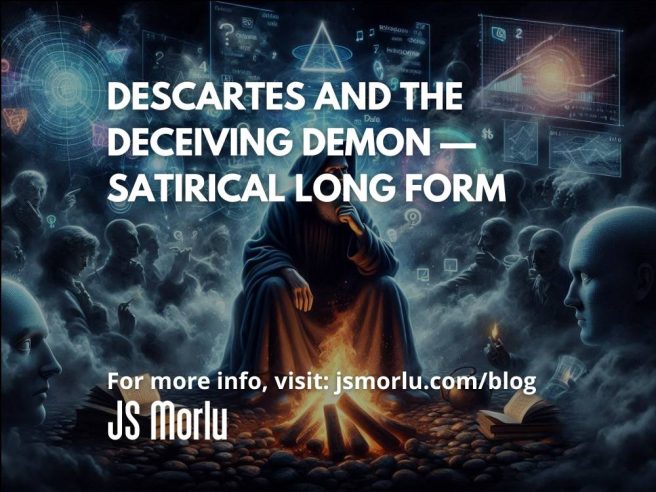By: John S. Morlu II, CPA
Picture René Descartes, the father of modern philosophy, sitting by the fire in 1641, sipping his wine, and suddenly panicking: “What if literally everything I believe is one big scam?”
Welcome to the world of the Deceiving Demon — the original con artist, centuries before crypto scams, Ponzi schemes, and corporate PowerPoints.
Descartes didn’t just fear a little trickery; he imagined a grand-scale scam of the entire cosmos. Forget losing your wallet — this was about losing reality itself. Imagine you’re sitting at your desk, coffee in hand, convinced of your productivity — but what if that coffee, your desk, and your very to-do list were just part of the demon’s prank? He was basically imagining The Matrix in the 1600s.
The Demon’s Job Description
Forget horns and pitchforks. This demon is basically the perfect fraud consultant. His skillset?
- Visual illusions: He convinces you that your eyes are reliable. You see a chair? Could just be Photoshop before Photoshop existed. Descartes thought he was looking at a log by the fire. For all he knew, it could have been a cosmic hologram, a medieval VR headset sponsored by Satan. The demon is the original VR headset, rendering a fake world on demand.
- Math tricks: He whispers, “Two plus three equals five,” and you nod. But for all you know, it could equal “banana” — and you’re just too deceived to notice. Think about that. Math — the holy grail of certainty — could be rigged. Imagine filing your taxes under demon math. Two plus three equals five today, but tomorrow it equals bankruptcy. This isn’t bad arithmetic; it’s cosmic-level accounting fraud.
- Confidence scams: He doesn’t even need facts. Just swagger, and you’ll believe him like he’s your favorite LinkedIn guru selling “10x growth hacks.” The demon invented overconfidence. He’s the guy in every pitch meeting who raises his voice and says “trust me” when the slide deck has no numbers. He thrives on charisma inflation. He doesn’t need proof — just applause.
In short: the demon is that guy in every company who talks a lot in meetings, dazzles with slides, but delivers absolutely nothing. Just ask Enron’s executives who built castles out of fake profits, Theranos promising blood tests that never worked, or FTX convincing investors their money was safe while it evaporated into thin air.
Why Descartes Invented This Villain
Because regular doubt wasn’t spicy enough. He wanted the extreme version — not “maybe my senses sometimes trick me,” but: “What if the universe is one massive gaslighting experiment run by the best scammer in history?”
He was tired of the old skepticism — doubting shadows, dreams, and mirages. Too basic. Descartes upgraded to deluxe skepticism: assume an all-powerful fraudster who spends 24 hours a day deceiving you for sport. If doubt were a drink, the demon is 200-proof.
Think of it as Descartes saying: “Okay, assume every politician, every banker, every ex who swore they’d change — were all one demon playing you. What can you still trust?”
The Punchline: Cogito, Ergo Sum
The demon can mess with your senses, math, and reality — but there’s one thing it can’t touch: the fact that you’re thinking.
Even if you’re being conned, you exist to be conned. Voilà: “I think, therefore I am.”
Basically, Descartes invented the ultimate clapback to gaslighting: “Fine, Demon. You can trick me about the world. But the very fact I notice you proves I’m real.”
This is the mic-drop moment in philosophy. No matter how much the demon tries to manipulate you, he can’t erase the fact that you’re experiencing thought itself. Even the experience of being tricked is proof that “you” are there to experience it. It’s the philosophical version of saying, “You tried it, but I caught you — and catching you proves I’m still in the game.”
The Demon in Today’s World
Fast-forward 400 years. The deceiving demon shows up in new disguises:
- Social Media: Tells you your life is terrible because you don’t have a yacht like “CryptoSteve97.” Every scroll is an illusion. That yacht could be rented. That “dream life” influencer might be crying in a studio apartment with three roommates. The demon’s trick today isn’t math — it’s filters.
- Corporate Bosses: Promise “synergy” while your paycheck stays allergic to growth. The demon thrives in quarterly meetings. He throws words like “synergy” and “efficiency” around, while employees quietly realize the only thing synergized is their workload.
- Marketing Teams: Sell you “limited edition” nonsense — as if running shoes are magical if they’re neon green. The demon rebranded himself as “Head of Brand Strategy.” He whispers, “These sneakers aren’t just shoes. They’re a lifestyle.” And suddenly, people are camping outside stores overnight for rubber soles.
- AI Hype Machines: Announce “revolutionary breakthroughs” every week that turn out to be slightly upgraded autocomplete. The demon knows people love buzzwords. He’s now the keynote speaker at AI conferences, announcing every small tweak as if it’s the Second Coming. The deception is no longer about chairs and cows — it’s about convincing you that autocomplete will cure cancer.
The deceiving demon isn’t in hell. He’s in your newsfeed. He’s in quarterly reports. He’s in the PowerPoint with 47 slides and zero substance. He ran Enron’s accounting, wrote Theranos’ lab reports, and managed FTX’s “trust me, bro” balance sheet.
Satirical Takeaway
Descartes’ demon wasn’t just philosophy. It was a warning label:
- If it feels too certain, check again. Nothing ages faster than overconfidence.
- If the numbers always add up perfectly, somebody’s cooking them. History is one long cautionary tale of balance sheets dressed up by demons with MBAs.
- If someone says “trust me,” hire an auditor. Or better yet, be your own. Every scam dies when someone blurts out, “Wait, but where’s the money actually coming from?”
And the final mic drop? Descartes proved one timeless rule:
The world will always have a deceiving demon. Your only weapon is relentless skepticism — and the courage to say, “Nice trick, but I still exist. Now show me the receipts.”
Because in the end, the demon wins by fog, not by fire. His only power is your failure to check the books, ask the questions, or challenge the story. Descartes gave us the antidote: keep thinking. Thinking is survival. Thinking is proof.
Field Guide to Modern Demons
- Enron (Fake Profits): Numbers that looked flawless on paper but were smoke and mirrors. The demon wore a tie and called it “creative accounting.”
- Theranos (Fake Science): A single drop of blood promised miracles, but the machines didn’t work. The demon wore a black turtleneck and called it “disruption.”
- FTX (Fake Trust): Billions vanished while investors were told everything was “safe.” The demon wore cargo shorts and called it “effective altruism.”
- Social Media (Fake Lives): Perfectly filtered happiness masking debt, depression, and doubt. The demon wore an Instagram filter and called it “influencing.”
- AI Hype (Fake Revolutions): Incremental improvements dressed as world-changing events. The demon wore a lanyard and called it “the future.”
Author: John S. Morlu II, CPA is the CEO and Chief Strategist of JS Morlu, leads a globally recognized public accounting and management consultancy firm. Under his visionary leadership, JS Morlu has become a pioneer in developing cutting-edge technologies across B2B, B2C, P2P, and B2G verticals. The firm’s groundbreaking innovations include AI-powered reconciliation software (ReckSoft.com) and advanced cloud accounting solutions (FinovatePro.com), setting new industry standards for efficiency, accuracy, and technological excellence.
JS Morlu LLC is a top-tier accounting firm based in Woodbridge, Virginia, with a team of highly experienced and qualified CPAs and business advisors. We are dedicated to providing comprehensive accounting, tax, and business advisory services to clients throughout the Washington, D.C. Metro Area and the surrounding regions. With over a decade of experience, we have cultivated a deep understanding of our clients’ needs and aspirations. We recognize that our clients seek more than just value-added accounting services; they seek a trusted partner who can guide them towards achieving their business goals and personal financial well-being.
Talk to us || What our clients says about us




